

Vol. 40 (Number 28) Year 2019. Page 17
GAMIDULLAEV, Bukar N. 1; DOKHOLYAN, Sergey V. 2; GAMIDULLAEV, Rami B. 3; SULTANOV, Garun S. 4 & SURAKATOV, Nurmagomed S. 5
Received: 09/05/2019 • Approved: 15/08/2019 • Published 26/08/2019
ABSTRACT: The relevance of research problem is determined with the need to develop a fundamentally new integrated state evaluation procedure of management cycles as main components of management processes reengineering at the enterprise. The functionality of study and the simplicity of calculations have proved the effectiveness of the proposed procedure and the practicability of its use in management processes reengineering at the enterprise, which allows to identify the blind sides and to develop reinforcing measures that ensure high efficiency of management system at the enterprise. |
RESUMEN: La relevancia del problema de investigación se determina con la necesidad de desarrollar un procedimiento de evaluación de estado integrado fundamentalmente nuevo de los ciclos de gestión como componentes principales de la reingeniería de procesos de gestión en la empresa. La funcionalidad del estudio y la simplicidad de los cálculos han demostrado la efectividad del procedimiento propuesto y la viabilidad de su uso en la reingeniería de procesos de gestión en la empresa, lo que permite identificar los lados ciegos y desarrollar medidas de refuerzo que garanticen una alta eficiencia del sistema de gestión en la empresa. |
The validity of modern dynamic life and market relations requires constant improvement of management models of business processes, which in turn requires new content state evaluation approaches of management processes and all enterprise management cycles as its components. Also, as a consequence, the relevance of the research problem is determined with the need to develop a fundamentally new integrated state evaluation procedure of management cycles in management processes reengineering at the enterprise.
The hypothesis of this study was to prove the relevance and necessity of developing an effective and innovative approach to state evaluation of management cycles in management processes reengineering at the enterprise.
The purpose of the study is to develop a fundamentally new state evaluation procedure of management cycles in management processes reengineering at the enterprise, presented as a group of indicators that ensure the qualitative analysis, evaluation and identification of reserves of management processes through the cyclic content of management processes reengineering at the enterprise.
In our opinion, the development of such evaluation procedure of management processes reengineering through state evaluation of management cycles in conditions of modern high dynamic activity of enterprises is of particular importance.
Special attention to the problems of evaluation indicators of management processes has been recently given by such researchers as: Nesterenko V.P., Petrushin S.I., Gubaidulina R.Kh., Pashkova L.A. (28), Balashova E.S. (6), Antipov D.V. (5), Tsapko S.G. (45), Hammer M. (17), Gromov A.I. (15), Jeston D. (19).
It is obvious, that the reengineering approach has already provided for the introduction of innovative technologies in its essence and content, which is also meant in our approach to the evaluation indicators. The works, devoted to the stated problem, are of special importance and the authors of such works are: Bondarenko V.V., etc. (8), Romanova A.D. (37), Osipov V.A. (30), Folomyev A.N. (10), Khan M. A., Panarina E. (20), Kuznetsov B.L., Kuznetsova S.B. (22), Gerasimov B.N., Novikova N.A. (13), Sukharev O.S. (42), Rozhdestvenskiy A.V., Golov R.S. (38), Andreeva E.S., Nechaev A.S. (4), Akatov N.B., Panarina E. N. (2), Tsymbalov A.A., Degtyareva E.D. (46), Berlin Center of OECD (35), Pertsev S.B. (33).
The issues of developing the models of reengineering activities for enterprise management, business process design and business process reengineering (BPR), the use of business process reengineering methods, assessing the impact of risks on the effectiveness of reengineering projects, etc., are studied in the works of such scientists as Avramovich N., Baosich M., Karich M., Berich D., Boyich Z., Yuovanovich V., Radosevich M. (36), Gunasekaran A.(16), Dassisti M. (9), McSwiney J.(23), Melo A. C., Fernandez E. (24), Mtsrkova M., Raynoga R. (44), Stefanesku L., Konstantinesku M. Stefanesku A., Konstantinesku P. (41), Suyova A., Marchinekova K., Hittmar S. (43), Nekrasov R.Yu., Tempel Yu.A., Tempel O.A.(27), Ferreira Kh.M., Shpak N., Sorochak O. (40).
For selection the most effective method of process management implementing at the enterprise, various methods of evaluation the effectiveness of business processes were developed. Modern developers of such methods are: Shapagatov S.R., Kartseva N.S., Valiullova R.I., Batanova M.V. (39), Istomina S.V. (18), Piksaikina O.V., Khodeneva E.A. (34).
Great attention to the problems of managing various systems and economic objects relating to our research has been given in recent years by such scientists as: Grigoriev S.N., Kutin A.A. (14), Alferov V.N. (3), Bashkatova Yu.I., Reshetko N.I. (7), Mikheev A.G. (25).
The scientists, who made a significant contribution to the development of management processes reengineering concept, are: Abdullaeva T.K. etc. (1), Parakhina V.N., Solomina K.A. (32), Gamidullaev R.B. (11, 12), Ogoleva L.N. (29), Oykhman E.G. (31), Mosyakov I.V. (26), Komissarova M.A. (21)
An incomplete picture of the problem, theoretical and practical significance has determined the need to develop a fundamentally new state evaluation procedure of management cycles in management processes reengineering at the enterprise that characterizes generally the content state of management processes.
Developing state evaluation procedure of management cycles in management processes reengineering at the enterprise, it is especially important to take into account the content state of management process. The management process, like any process in the socio- economic system, has a rich content that reveals the set of its operations, grouped according to its stages.
So, the organizational content of the management process is shown in a sequence of organizational leverages and is expressed in the stages of regulation, norm setting, recommended practices, and responsibility.
In the proposed procedure, each group of indicators basically characterizes the content and discloses information support for management processes. Developing this procedure, the works of next researchers were used: Nesterenko V.P., Petrushin S.I., Gubaidulina R.Kh., Pashkov L.A. (28), Balashova E.S. (6), Antipov D.V. (5), Tsapko S.G. (45), Hammer M. (17), Gromov A.I. (15), Jeston, D. (19).
Developing this procedure, the materials of determining consolidated indicators, various branch research institutes, and various effectiveness evaluation procedures of business processes were generalized, modern developers of which, are: Shapagatov S.R., Kartseva N.S., Valiullova R.I., Batanova M.V. (39), Istomina S.V. (18), Piksaikina O.V., Khodeneva E.A. (34).
For calculation the indicators of the proposed procedure, the documents of statistical and accounting reporting, operational accounting, etc., as base values, are used. When the values at the enterprise are absent (for example, development and implementation of operation cards, management procedures, etc. at some enterprises), it is necessary to do a suitable research, the results analysis of which, can provide base values.
Below we propose our state evaluation procedure of management cycles in management processes reengineering at the enterprise, where evaluation indicators of each cycle of management process are separately presented.
Let us dwell in detail on our evaluation procedure of organization cycles as the most important technological component of the management process reengineering.
Quantitatively, each of the indicators, offered below, is evaluated by an appropriate coefficient, the number value of which can be more than "0", but less than "1".
This group includes evaluation analysis indicators of the organizational cycle of the management process, which characterize a sequential use of organizational leverages: regulation, norm setting, recommended practices, and responsibility.
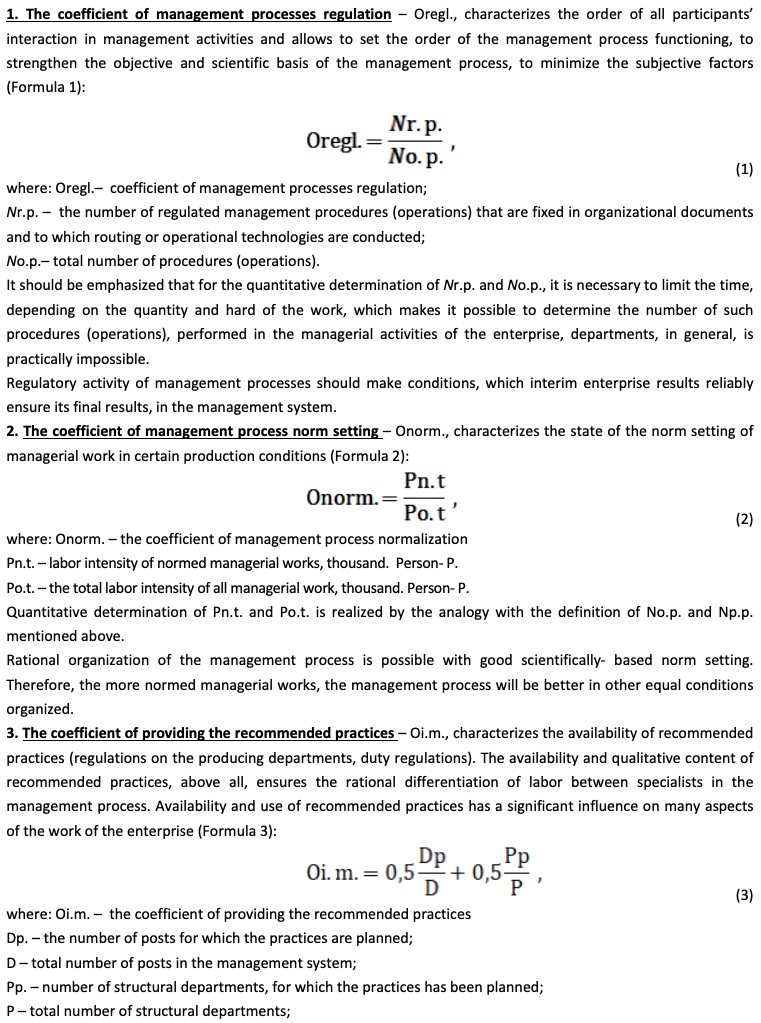
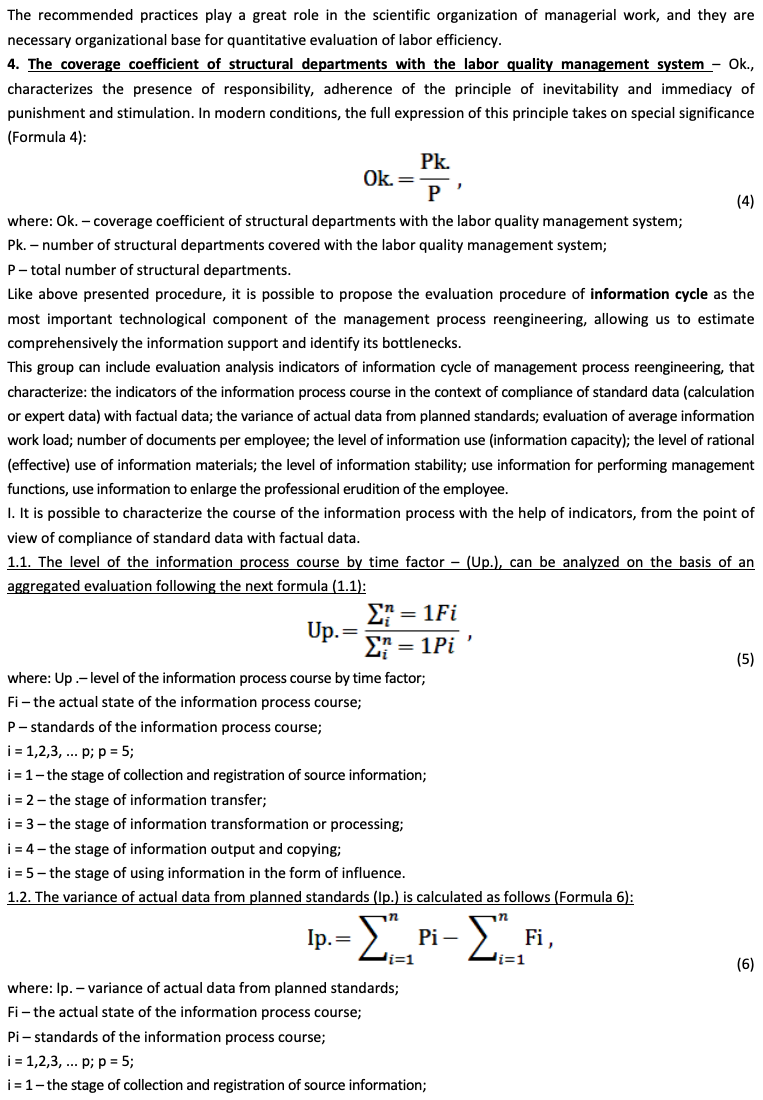
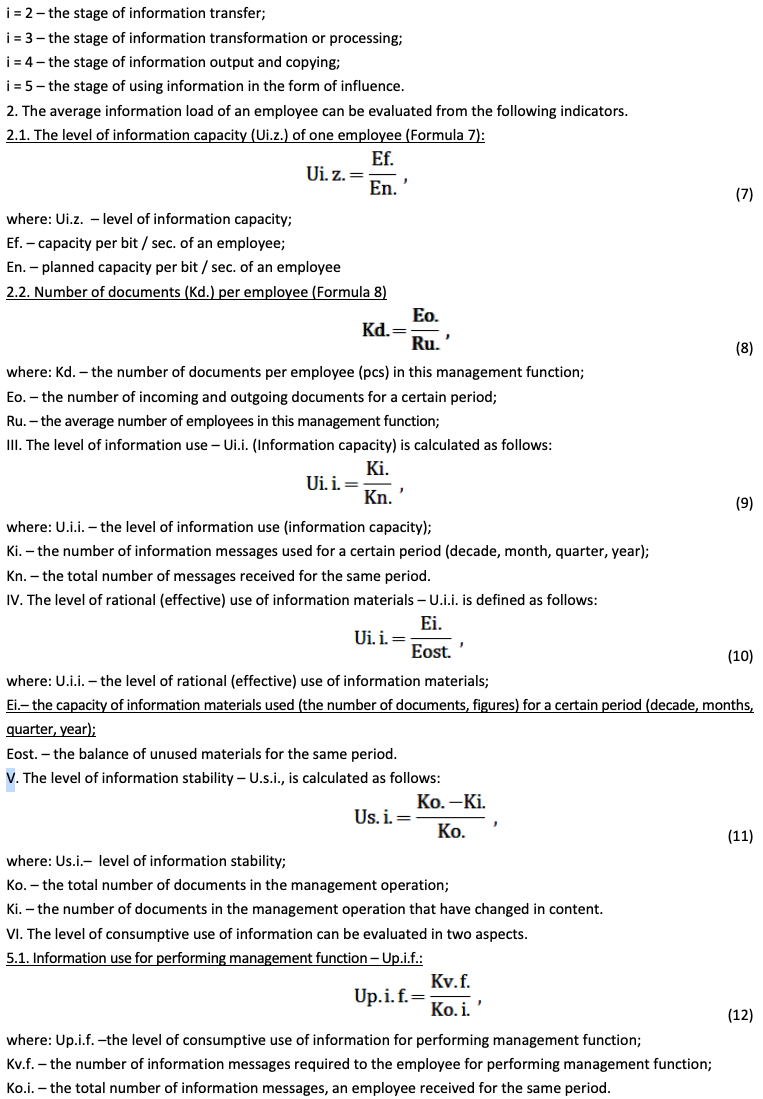
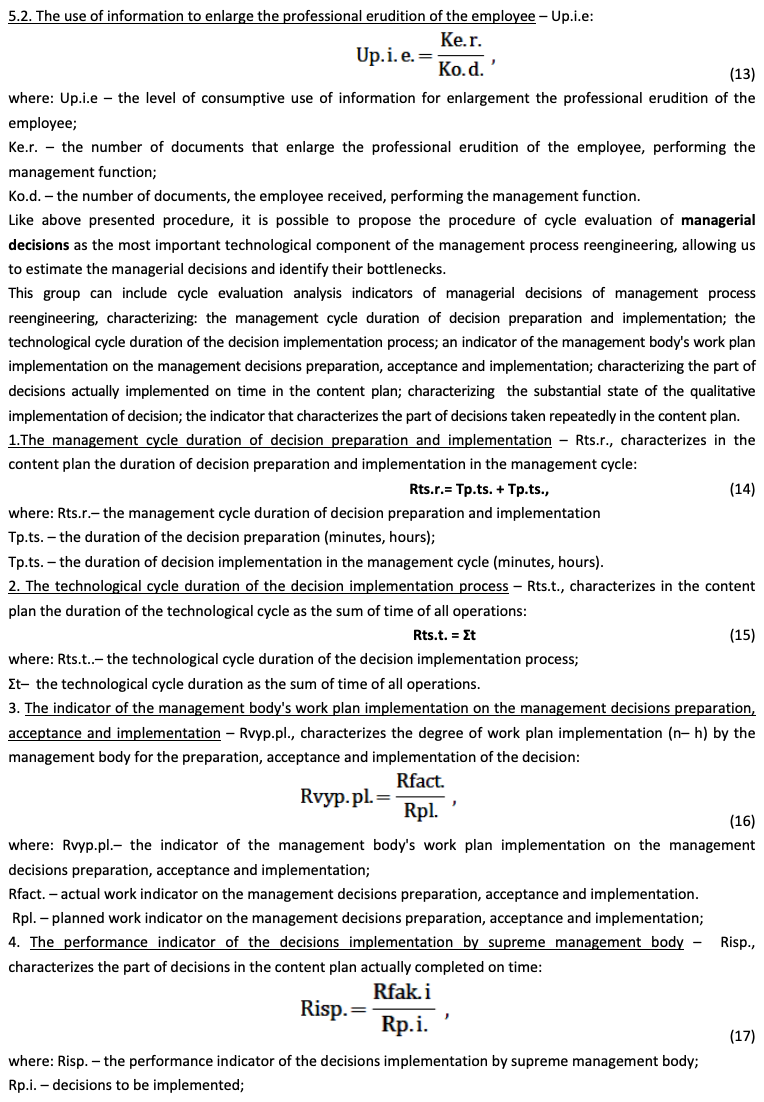
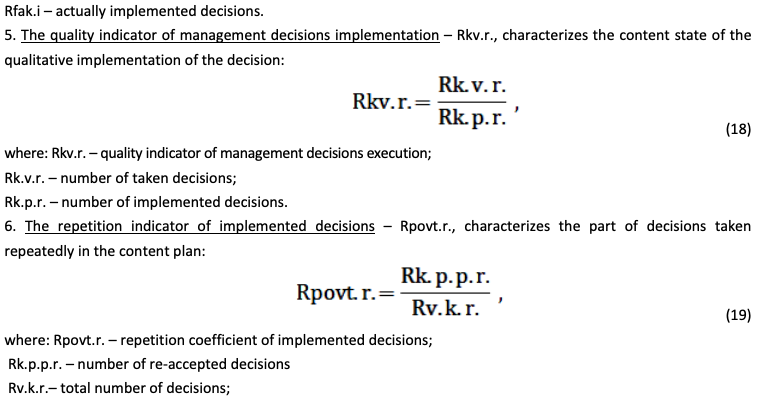
Our research confirmed the practicability of the presented procedure on the implementation of management processes reengineering at the enterprise and our expectations of the effectiveness, the algorithm presented below, for the state evaluation of the management cycle of management processes reengineering, which with this approach, it is advisable to perform in several stages (Table 1).
At the first stage, it is necessary to find out what is the reason for the need to state evaluation of the management cycles, why it is necessary to identify the possibility of getting the source data (statistical, accounting, operational, etc.) or the need to plan a special study, analyzing each aspect of the enterprise's activity.
At the second stage, the ordinary calculation of the numeric value of these indicators is performed using all necessary information.
At the third stage, a consolidated indicator is determined on the basis of the acquired particular indicators.
At the fourth stage, the development of certain activities is carried out, on the basis of the acquired consolidated value, which should ensure the compliance of the management cycle with the scientific– based level.
Table 1
The algorithm of state evaluation of the management process
The stages of state evaluation of the management process |
Conducting operations |
1.Determination of necessity, possibility and practicability of the use of the procedure |
1.1 The analysis of each aspect of the enterprise's activities 1.2 Determination of having the source data: a) statistical b) accounting c) operational d) research, etc. |
2. The calculation of numeric values of particular indicators |
2.1 Control of information completeness required for the calculation 2.2 Calculation of numeric values |
3. Determination of numeric values of particular indicators |
3.1 Selection of numeric values of all particular indicators, which are necessary for the calculation of consolidated indicators. 3.2 Calculation of the consolidated indicator |
4. Use of the data acquired for the development of certain activities |
4.1 Development of necessary activities |
A distinctive feature of the proposed procedure is that:
– Firstly, after determining the above presented indicators, such procedure allows to compare the values acquired with the standard (or base values), and also allows to determine what organizational measures necessary to develop, as they can be the basis for management processes reengineering;
– Secondly, it mainly considers and complies with the above mentioned the most essential principles, to which the methods of quantitative state evaluation of the management processes should satisfy.
The proposed state evaluation procedure of management cycles, as noted, characterizes the substantial state of the management process, which represents the idea of this approach.
It should also be noted that the state of all management cycles of the management process depends on many elements of the management system and it is in interrelation with them. State changing of any one of the elements of the management system leads to certain changes, as management cycles, as the state of management process. Therefore, studying the management processes and choosing the ways to improve it, especially the management processes reengineering, it is necessary to consider the management process in relation to all management elements.
A holistic analysis of management processes needs to identify the indicators that have been on a low level during a number of years, to identify the causes and plan measures to improve them. For clarity, the results of the analysis should be shown on a graph: it will provide a fairly accurate picture of the proposed state of the management process and indicate the direction of certain activities.
Thus, the proposed procedure allows using identified indicators to determine the status and trends of management cycles and, accordingly, the effectiveness of management process reengineering, the reserves of its improvement and the degree of implementation aimed at these activities. Moreover, a distinctive feature of this procedure is that like state evaluation procedure of management cycles, the evaluation of other technological components of management process reengineering can be presented using particular indicators of their evaluation. Therefore, at the present stage, the proposed methodological approach to state evaluation of management cycles of enterprise management processes reengineering can be of particular practical importance. And the key role plays here the intensification indicators of management processes and the use of working time, which are of particular importance in the system of indicators of economic efficiency not only of enterprise, but also of management, which is very important for the real prospect and wider use in economic science and practice.
Abdullaeva T.K., Gamidullaev B. N., Gamidullaev R. B. (2016). The concept of management processes reengineering: defining categories of management science. Ekonomika i predprinimatelstvo, 1(1):184-186.
Akatov N. B., Panarina E. N. (2014). Competence center in the development strategy of a large high-tech enterprise. Menedzhment i biznes-administrirovaniye, 3: 184-186.
Alferov V. N. (2016). Transformation of anti-crisis management in modern economic conditions. Moscow: INFRA-M.
Andreeva E. S., Nechaev A. S. (2014). The development of innovative potential in Russia: problems and the ways of their solution. Finansy i kredit, 17(593): 22-29.
Antipov D.V. (2010). Formation of evaluation indicators model of organization sustainable development. Vector nauki tolyattinskogo gosudarstvennogo universiteta, 4: 186-189.
Balashova E.S. (2014). Evaluation indicators of organizational efficiency of business processes. St. Petersburg State Polytechnical University Journal. Economics, 2(192): 185-190.
Bashkatova Yu. I., Reshetko N. I. (2014). Modern information systems as a factor of improving the quality of management decisions and competitiveness of organizations. Naukovedenie, 2 (21).
Bondarenko V. V., et al. (2018). The role of regional institutions development in increasing the innovative potential of the Russian Federation’s subjects. Regionalnaya ekonomika: teoriya i praktika, 16(1): 83-100.
Dassisti M. (2010). «Hy-change»: an hybrid methodology for continuous performance improvement of manufacturing processes. International Journal of Production Research, 48 (15): 4397-4422.
Folomyev A. N. (2017). A new industrial policy and innovative transformation of national economy. Innovatsii, 12: 28-33.
Gamidullaev R. B. (2011). Organizational management cycles reengineering at industrial enterprises. Ph.D. thesis. Penza.
Gamidullaev R. B. (2014). Conceptual approach of enterprise management processes reengineering. Moscow: Pero, 156.
Gerasimov B. N., Novikova N. A. (2015). The specific nature of management process implementation of innovative activity at the chemicals enterprises. Vestnik Povolzhskogo gosudarstvennogo universiteta servisa. Ekonomika, 4(42): 110-121.
Grigoriev S. N., Kutin A. A. (2012). Organization and management of complex machine-building production on the basis of CALS- technology. Izvestiya Samarskogo nauchnogo tsentra Rossiyskoy akademii nauk, 14(4): 403-407.
Gromov, A. I. (2016). Business process management: modern methods. Urait, 367.
Gunasekaran A. (2002). KOBUB. Modelling and analysis of business process reengineering. International Journal of Production Research, 40(11): 2521±2546.
Hammer M. (2012). Faster, better, cheaper: Nine methods of business process reengineering. Moscow: Alpina, 356.
Istomina S. V., et al. (2018). Methods of determining the innovative potential of socio-economic objects of different hierarchical levels using vector analysis elements and field theory. Natsionalnyye interesy: prioritety i bezopasnost, 14(1): 97-120.
Jeston D. (2015). Management of business processes. Practical guide to the successful projects implementation. Moscow: Symbol, 512.
Khan M. A., Panarina E. (2017). The Role of National Cultures in Shaping the Corporate Management Cultures: A Four Countries Theoretical Analysis. Journal of Eastern European and Central Asian Research (JEECAR), 4(1): 25.
Komissarova M. A. (2011). Opportunities of reengineering use as a main instrument for company management from the point of view of process approach. Kreativnaya ekonomika, 7:10-16.
Kuznetsov, B. L., Kuznetsova S. B. (2016). Technological management in conditions of scientific-technical revolution of the XXI century. Upravlenets, 3: 2-7.
McSwiney J. (1995). Business Process Reengineering for Small and Medium Sized Manufacturing Enterprises. Re-engineering the Enterprise, 164-174.
Melo A. C., Netto M. A., Filho V. J., Fernandes E. (2010). Knowledge management for improving business processes: an analysis of the transport management process for indivisible exceptional Cargo. Pesquisa Operacional, 30(20):305-330.
Mikheev A. G. (2016). The management systems of business process and administrative regulations on the example of the free RunaWFE program. Moscow: DMK, 336
Mosyakov I. V. (2011). Business processes reengineering of a virtual enterprise. Voprosy innovatsionnoy ekonomiki, 2: 36-42.
Nekrasov R. Yu., Tempel Yu. А., Tempel О.А. (2017). Innovative model of business process reengineering at machine building enterprises. Earth and Environmental Science, 87.
Nesterenko V. P., Petrushin S. I., Gubaidulina R. Kh., Pashkov L. A. (2015). Calculation method of the optimal variant of technological process in mechanical engineering. International journal of experimental education, 11(2): 235-238.
Ogoleva L. N. (2010). Radical reengineering of manufacture. Moscow: INFRA-M, 245
Osipov V. A. (2018). Evaluation of innovative development of industrial enterprises and the ways of its stimulation. Problemy teorii i praktiki upravleniya, 1: 89-97.
Oykhman E. G. (2010). Business reengineering. Moscow: Finansy i statistika, 152.
Parakhina V.N., Solomina K.A. (2015). Business processes reengineering of a growing industrial company as a basis for its organizational renewal and reduction of entropy in the management system. Vestnik Severo-Kavkazskogo federalnogo universiteta, 5(50): 95-102.
Pertsev S.B. (2013). Influence of innovative system on the economic growth of region. Sovremennye problemy nauki i obrazovaniya, 6. available at:http://www.science-education.ru/ru/article/view?id=11156 (accessed: 29 March 2018).
Piksaikina O. V., Khodeneva E. A. (2017). Economic-mathematical model of management optimization of business processes at an industrial enterprise. Vestnik Gumanitarnogo universiteta, 1 (16): 14-19.
Prospects of science, industry and technology. (2014). Berlin Center of OECD, available at: http: //www.keepeek.com/DigitalAsset - Management/oecd/science-and-technology/oecdscience-technology-and-in.
Radosevich M., Baosich M., Karich M., Yovanovich V., Dalibor B., Boyich Z., Avramovich N. (2014). Implementation of Business Process Reengineering in Human Resource Management. Engineering Economics, 25(2): 211-222.
Romanova A. D. (2018). Evaluation of spacial and temporal peculiarities of innovative development of regions. Problemy teorii i praktiki upravleniya, 1: 43-54.
Rozhdestvenskiy A. V., Golov. R. S. (2015). The economic development of engineering in Russia: the situation, dynamics of development and the main vectors of modernization. Ekonomika i upravleniye v mashinostroyenii, 1(37): 5-12.
Shapagatov S. R., Kartseva N. S., Valiullova R. I., Batanova M. V. (2016). Evaluation efficiency system of industrial enterprise’s business processes // Molodoy uchenyy, 21:541-547. available at: https: //moluch.ru/archive/125/34393/ (accessed: 21 May 2018).
Shpak N., Sorochak O., Hvozd M., Sroka W. (2018). Risk Evaluation of the Reengineering Projects: A Case Study Analysis. Scientific Annals of Economics and Business, 65(2): 215-226.
Stefanesku L., Konstantinesku M., Stefanesku A., Konstantinesku P. (2007). Rethinking the business process through reengineering. Journal of Applied Economic Sciences, 1(2): 59-74.
Sukharev O. S. (2015). Economic growth and technological changes: global trends. Mirovaya ekonomika , 2: 131-146.
Suyova A., Marchinekova K., Hittmar S. (2017). Sustainable Optimization of Manufacturing Process Effectiveness in Furniture Production. Sustainability, 9: 923.
Suyova A., Raynoga R., Mtsrkova M. (2014). Business process performance management principles used in Slovak enterprises. Procedia - Social and Behavioral Sciences, 109: 276-280.
Tsapko S.G., Luneva E.E., Kurenkov I.N., Suhanova U. A. (2011). Evaluation procedure of business processes of instrument-making enterprise. Informatika i sistemy upravleniya, 4(30): 104-115.
Tsymbalov, A. A., Degtyareva, E. D. (2014). The commoditization of scientific developments: problems and solutions. Innovatsii v selskom khozyaystve, 4(9): 184-187.
1. Doctor of Economic Sciences, Professor, Professor of the Department "Management", Faculty of Management Dagestan State University (DSU), 367025, Russian Federation, Republic of Dagestan, Makhachkala, M. Gadzhieva street, 43a, e-mail: bukar85@mail.ru
2. Doctor of Economics, Professor, Chief researcher of the Department of theory and methodology of regional development Institute of social and economic researches of Dagestan scientific center of Russian Academy of Sciences, 367030, Russian Federation, Republic of Dagestan, Makhachkala, Yaragskogo street, 75, e-mail: sergsvd@mail.ru
3. Candidate of Economic Sciences, Docent, Senior Lecturer of the Department ‘Management’, Faculty of Engineering and Economics Dagestan State Technical University (DSTU), 367015, Russian Federation, Republic of Dagestan, Makhachkala, I. Shamil Avenue, 70, e-mail: bukar85@mail.ru
4. Candidate of Economic Sciences, Docent, Docent of the Department "Audit and economic analysis" Dagestan State University (DSU), 367025, Russian Federation, Republic of Dagestan, Makhachkala, M. Gadzhieva street, 43a, e-mail: sirius2001@mail.ru
5. Candidate of Economic Sciences, Docent, Senior Lecturer of the Department of customs, Dagestan State Technical University (DSTU), 367015, Russian Federation, Republic of Dagestan, Makhachkala, I. Shamil Avenue, 70, e-mail: sur71@yandex.ru